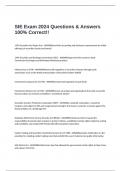100% Correct!!
1933 Securities Act (Paper Act) - ANSWERsets forth accounting and disclosure requirements for initial
offerings of securities (stocks and bonds)
1934 Securities and Exchange Commission (SEC) - ANSWERSupervised the country's Stock
Commission Exchanges and eliminated dishonest practices
Maloney Act of 1938 - ANSWERAllowed self-regulation of securities industry through trade
associations such as the National Association of Securities Dealers (NASD)
Investment Company Act of 1940 - ANSWERcreated and regulated mutual funds
Investment Advisers Act of 1940 - ANSWERfocuses on people and organizations that seek to provide
financial advice to investors and defines "investment adviser"
Securities Investor Protection Corporation (SIPC) - ANSWERa nonprofit corporation, created by
Congress and subject to SEC and congressional oversight, that insures customer accounts against the
financial failure of a brokerage firm
Employee Retirement Income Security Act (ERISA) - ANSWERFederal law that increased the
responsibility of pension plan trustees to protect retirees, established certain rights related to vesting
and portability, and created the Pension Benefit Guarantee Corporation
Insider Trading and Securities Fraud Enforcement Act of 1988 - ANSWERprovides clarification on the
penalties for violating insider trading rules that prohibit the use of material non-public information
USA Patriot Act - ANSWERAntiterrorism law that allowed the government certain rights to help chase
and capture terrorists
,Dodd-Frank Wall Street Reform and Consumer Protection Act - ANSWERrepresented an effort to
reshape the U.S. regulatory system in the areas of consumer protection, trading restrictions, credit
ratings, regulation of financial products, transparency and corporate governance and disclosure
Uniform Practice Code (UPC) under FINRA - ANSWERstandardizes the dates and times for each type
of settlement
The MSRB has *NO* enforcement authority (T/F) - ANSWERT
Department of the Treasury - ANSWER-Collects, borrows, spends, and prints money
-Responsible for the overseeing of the U.S. economic/financial systems
The IRS is the largest bureau of the Treasury (T/F) - ANSWERT
The IRS is *NOT* the largest bureau of the Treasury (T/F) - ANSWERF
Fidelity Bond (Blanket Fidelity Bond) - ANSWERinsurance policy that pays the employer money in the
case of employees' theft
The FDIC protects customers funds up to what amount?
a. $100,000
b. $200,000
c. $250,000
d. $500,000 - ANSWERc.
What is the minimum coverage requirement of a Fidelity Bond?
a. $100,000
b. $200,000
c. $250,000
d. $500,000 - ANSWERa.
How much does the SIPC cover for an individual in credit/cash?
,a. Credit $1 mil. - Cash $500,000
b. Credit $750,000 - Cash $100,000
c. Credit $500,000 - Cash $250,000
d. Credit $250,000 - Cash $100,000 - ANSWERc.
Accredited Investor - ANSWERperson who is permitted to invest in higher-risk investments such as
business start-ups (natural person earning steady income over past 2 years)
Rules of Conduct/Fair Practice under FINRA - ANSWERaddress dealings with the public on the part of
brokers/dealers as member firms
"you must treat the customer well"
Code of Procedures (COP) under FINRA - ANSWERoutlines the procedural process in the event of
violations of trade practice rules
*most important categories of by-laws under FINRA, as it allows FINRA to fine, suspend, bar, expel, or
impose any other penalty deemed necessary*
Code of Arbitration under FINRA - ANSWERmethod of resolving disputes (usually money) in the
securities business. All decisions are final and binding on all parties
Municipal Securities Rule making Board (MSRB) - ANSWERThis organization was created in 1975 as
an independent self-regulatory organization designed to oversee the municipal securities industry
The MSRB is authorized to regulate municipal entities including state/local gov (T/F) - ANSWERF
The MSRB is *NOT* authorized to regulate municipal entities such as state/local gov (T/F) - ANSWERT
The MSRB has enforcement authority (T/F) - ANSWERF
, Retail Investor - ANSWERA retail investor is an individual investors who buy and sell securities for
their personal account, and not for another company or organization
A Market Maker assumes risk of holding inventory (T/F) - ANSWERT
A Market Maker does not assume risk of holding inventory (T/F) - ANSWERF
S-1 - ANSWERRegistration for most IPOs (also known as *registration statement*)
S-3 (Abbreviated Registration Statement) - ANSWERIf an issue is an "add-on" offering, the issuer can
qualify for this
A "Tombstone" notifies details concerning an offering including what?
a. Probable price range
b. Description of the issue
c. Members of the syndicate
d. All the above - ANSWERd.
During a restricted period, a corporation falling under Tier-2 requires what avg. daily trading volume
(ADTV)/public float value?
a. ADTV exceeds $1 mil. - Public Float exceeds $150 mil.
b. ADTV is at least $100,000 - Public Float is at least $25 mil.
c. ADTV less than $100,000 - Public Float is less than $100,000
d. No ADTV - No Public Float - ANSWERb.
During a restricted period, a corporation falling under Tier-1 requires what avg. daily trading volume
(ADTV)/public float value?
a. ADTV exceeds $1 mil. - Public Float exceeds $150 mil.
b. ADTV is at least $100,000 - Public Float is at least $25 mil.
c. ADTV less than $100,000 - Public Float is less than $100,000
d. No ADTV - No Public Float - ANSWERa.


